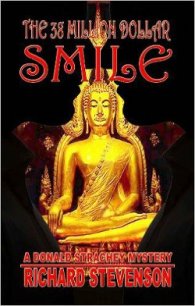Congo - Crichton Michael (книги регистрация онлайн бесплатно .TXT) 📗
Ross said, “What things, Amy? Are they animals?” Elliot told them that Amy could not abstract the category “animals.” “She thinks people are animals,” he explained. “Are the bad things people, Amy? Are they human persons?”
No.
Munro said, “Monkeys?”
No. Bad things. not sleep night.
Munro said, “Is she reliable?”
What means?
“Yes,” Elliot said. “Perfectly.”
“She knows what gorillas are?”
Amy good gorilla, she signed.
“Yes, you are,” Elliot said. “She’s saying she’s a good gorilla.”
Munro frowned. “So she knows what gorillas are, but she says these things are not gorillas?”
“That’s what she says.”
2. Missing Elements
ELLIOT GOT ROSS TO SET UP THE VIDEO CAMERA AT the outskirts of the city, facing the campsite. With the videotape running he led Amy to the edge of the camp to look at the ruined buildings. Elliot wanted to confront Amy with the lost city, the reality behind her dreams-and he wanted a record of her responses to that moment. What happened was totally unexpected.
Amy had no reaction at all.
Her face remained impassive, her body relaxed. She did not sign. If anything she gave the impression of boredom, of suffering through another of Elliot’s enthusiasms that she did not share. Elliot watched her carefully. She wasn’t displacing; she wasn’t repressing; she wasn’t doing anything. She stared at the city with equanimity.
“Amy know this place?”
Yes.
“Amy tell Peter what place.” Bad place old place.
“Sleep pictures?” This bad place.
“Why is it bad, Amy?”
Bad place old place.
“Yes, but why, Amy?” Amy fear.
She showed no somatic indication of fear. Squatting on the ground alongside him she gazed forward, perfectly calm.
“Why Amy fear?”
Amy want eat.
“Why Amy fear?”
She would not answer, in the way that she did not deign to answer him whenever she was completely bored; he could not provoke her to discuss her dreams further. She was as closed on the subject as she had been in San Francisco. When he asked her to accompany them into the ruins, she calmly refused to do so. On the other hand, she did not seem distressed that Elliot was going into the city, and she cheerfully waved goodbye before going to demand more food from Kahega.
Only after the expedition was concluded and Elliot had returned to Berkeley did he find the explanation to this perplexing event-in Freud’s Interpretation of Dreams, first published in 1887.
It may happen on rare occasions that a patient may be confronted by the reality behind his dreams. Whether a physical edifice, a person, or a situation that has the tenor of deep familiarity, the subjective response of the dreamer is uniformly the same. The emotive content held in the dream-whether frightening, pleasurable, or mysterious- is drained away upon sight of the reality… We may be certain that the apparent boredom of the subject does not prove the dream-content is false. Boredom may be most strongly felt when the dream-content is real. The subject recognizes on some deep level his inability to alter the conditions that he feels, and so finds himself overcome by fatigue, boredom, and indifference, to conceal from him his fundamental helplessness in the face of a genuine problem which must be rectified.
Months later, Elliot would conclude that Amy’s bland reaction only indicated the depth of her feeling, and that Freud’s analysis was correct; it protected her from a situation that had to be changed, but that Amy felt powerless to alter, especially considering whatever infantile memories remained from the traumatic death of her mother.
Yet at the time, Elliot felt disappointment with Amy’s neutrality. Of all the possible reactions he had imagined when he first set out for the Congo, boredom was the least expected, and he utterly failed to grasp its significance-that the city of Zinj was so fraught with danger that Amy felt obliged in her own mind to push it aside, and to ignore it.
Elliot, Munro, and Ross spent a hot, difficult morning hacking their way through the dense bamboo and the clinging, tearing vines of secondary jungle growth to reach new buildings in the heart of the city. By midday, their efforts were rewarded as they entered structures unlike any they had seen before. These buildings were impressively engineered, enclosing vast cavernous spaces descending three and four stories beneath the ground.
Ross was delighted by the underground constructions, for it proved to her that the Zinj people had evolved the technology to dig into the earth, as was necessary fur diamond mines. Munro expressed a similar view: “These people,” he said, “could do anything with earthworks.”
Despite their enthusiasm, they found nothing of interest in the depths of the city. They ascended to higher levels later in the day, coming upon a building so filled with reliefs that they termed it “the gallery.” With the video camera hooked to the satellite linkup, they examined the pictures in the gallery.
These showed aspects of ordinary city life. There were domestic scenes of women cooking around fires, children playing a ball game with sticks, scribes squatting on the ground as they kept records on clay tablets. A whole wall of hunting scenes, the men in brief loincloths, armed with spears. And finally scenes of mining, men carrying baskets of stones from tunnels in the earth.
in this rich panorama, they noticed certain missing elements. The people of Zinj had dogs, used for hunting, and a variety of civet cat, kept as household pets-yet it had apparently never occurred to them to use animals as beasts of burden. All manual labor was done by human slaves. And they apparently never discovered the wheel for there were no carts or rolling vehicles. Everything was carried by hand in baskets.
Munro looked at the pictures for a long time and finally said, “Something else is missing.”
They were looking at a scene from the diamond mines, the dark pits in the ground from which men emerged carrying baskets heaped with gems.
“Of course!” Munro said, snapping his fingers. “No police!’’
Elliot suppressed a smile: he considered it only too predictable that a character like Munro would wonder about police in this long-dead society.
But Munro insisted his observation was significant. “Look here,” he said. “This city existed because of its diamond mines. It had no other reason for being, out here in the jungle. Zinj was a mining civilization-its wealth, its trade, its daily life, everything depended upon mining. It was a classic one-crop economy-and yet they didn’t guard it, didn’t regulate it, didn’t control it?”
Elliot said, “There are other things we haven’t seen- pictures of people eating, for example. Perhaps it was taboo to show the guards.”
“Perhaps,” Munro said, unconvinced. “But in every other mining complex in the world guards are ostentatiously prominent, as proof of control. Go to the South African diamond mines or the Bolivian emerald mines and the first thing you are made aware of is the security. But here,” he said, pointing to the reliefs, “there are no guards.”
Karen Ross suggested that perhaps they didn’t need guards, perhaps the Zinjian society was orderly and peaceful. “After all, it was a long time ago,” she said.
“Human nature doesn’t change,” Munro insisted:
When they left the gallery, they came to an open courtyard, overgrown with tangled vines. The courtyard had a formal quality, heightened by the pillars of a temple-like building to one side. Their attention was immediately drawn to the courtyard floor. Strewn across the ground were dozens of stone paddles, of the kind Elliot had previously found.


![[Magazine 1968-012] - The Million Monsters Affair - Davis Robert Hart (серия книг .txt) 📗](/uploads/posts/books/56864/56864.jpg)

